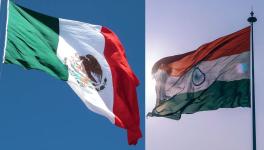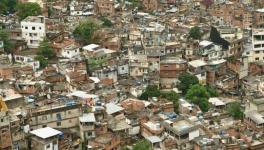Challenges for the Left in Latin America
Newsclick speaks to Professor Harry Vanden from the Department of Government and International Affairs, University of Southern Florida on the challenges for the Left in Latin America. Professor Harry says the people who had tasted the effects of neo-liberal policies will never go back and expresses his confidence in the people's resolve to resist efforts to bring them back into the neo-liberal regime. In this, he says, they have many lessons to offer to the rest of the world.

Transcript:
Prabir Purkayastha (PP): Hello and welcome to Newsclick. Today we have with us Prof. Harry Vanden who is from South Florida University and who has written extensively on Latin America and has also been a commentator on the recent events and the past events there. Harry, good to have you with us.
Harry Vanden (HV): It's a pleasure to be here and to be on Newsclick.
PP: Latin America has been in news recently – huge demonstrations in Brazil; vibrant Left movement emerging out there which has been noticed all over the world. Quite interesting because the Left in lots of other parts of the world is somewhat in retreat. Do you think the Latin American Left has new things to tell the world about what's happening?
HV: Oh, very much. One don't forget that a few years ago we almost despaired because we thought the Left was in retreat, if not submission in Latin Amercia. But the neo-liberal policy in Latin America has been so unsuccessful that it has actually become a factor in mobilising people against then neo-liberal policy; in the process of developing a new politics, a new form of participation; a greater concept of citizenship indeed. Many of us chart this recent upsurge to the Caracasso which was an uprising in Caracass, Venezuela in 1989 after the democratic government, not a repressive government endeavoured to implement very bad neo-liberal policies. It was from that then Chavez and his colleagues in the Bolivarian circles decided they needed to make a change which led to a coup attempt which led then to the creation of Chavez's Fifth republic movement. Indeed, it was the neo-liberal policies in Mexico which prompted the Zapatistas to rise up the same day that the North American Free Trade Agreement was implemented in January 1994. This has been ironically a great boon and has invigorated Latin American mobilization. But further I think we should note that the Latin American Left is indeed charting new waters. The orthodox parties have become much less relevant. The United States and the neo-liberal Washington consensus as we call it in the Western hemisphere, the IMF, the World Bank, the US Department of State Agencies for International Development have prompted a lot of change and tried to and for a while Latin Americans, perhaps a little like folks in India, were starting to buy it but the economic consequences just did not wash and so after 95, after the late 90s, you get realisation that some significant change is necessary. We could look for instance at the uprising by the national indigenous confederation of Ecuadorians in 2000 when they literally just stormed the government and took over the congressional building for one day. And, of course, in more recent times we see that after attempts to stop the upsurge of the people in Bolivia, we just have again a massive mobilisation - thousands of people coming down in La Paz and demanding that the government change its policies, demanding that the president leave and then when the vice president would not change his policies as the new president, two years later in 2005 they demanded he leave, they demanded they have a decent and neutral interim government. They demanded elections, they demanded a new Congress and of course that paves the way for Evo Morales to arrive and he comes in with a very strong anti neo-liberal agenda and really starts to go about implementing change.
PP: Of course, one of the elements in this has been that Latin America entered the neo-liberal era perhaps earlier than anybody else and also a much more, shall we say, very very predatory economic order - Chilean Coup, the Milton Friedman kind of regime brought in over there and, of course, that became the pre-cursor to what rest of the Latin America was to do. Also the fact that it had really military governments in 60s and 70s which were highly repressible allowing such neo liberal polices to be really implemented first. So all that has changed in the last 20 years. And, do you think in that sense, the rest of the world which has entered the neo-liberal phase later, would follow the same trajectory?
HV: Most certainly, that's a possibility. I think the rest of the world has to chart its own course, but certainly one can learn and one can study, one can see, if not only the mechanisms of change, the mechanisms of participation, the enfranchisement of the masses, the redefining, the redefinition of the citizenship to include the hitherto marginalized, hitherto for subaltern - that is perhaps very significant. Some are riding that indeed this sort of neo-Marxist, neo-socialist model that's being developed in Latin America, might indeed have very broad applicability; so we have to see and we should note, of course that the United States exercised a vast deal of hegemony in Latin America. So indeed, they were able to push the implementation of the neo-liberal policies bit more strongly. Indeed, I spoke to the National Association of Economists in Ecuador in 1995 and there were so many of the US trained economists there and of course representatives of some of the government agencies - US government and Ecuadorian government and they were saying: there is no alternative; one must go along. Well indeed that proved not to be the case. Indeed the Latin Americans have developed their own alternative. One that seems to be working fairly well for them. Yes, neo-liberalism was able to have some success in Chile after very repressive policies against the workers and so many others but even the successes in Chile could not be replicated elsewhere. Generally the neo-liberal policies have been a signifcant failure, particularly vis-a-vis the masses, vis-a-vis the labouring people of Latin America. Though, clearly some upper echelons and some members of the middle class did benefit.
PP: You know, if you look at countries which have been in the forefront of the Latin American Left, if you will, basically Venezuela, now Ecuador - what is the ALBA Axis. But you also have countries like Brazil which have not been particularly at the forefront of what you would call the Left reforms, but have also been fair amount of anti-United States hegemony of Latin America. Do you think that all this has actually meant that the weakening of the US hegemony in Latin America in overall terms is a very significant element in what's happening?
HV: oh, clearly. Keep in mind that the United States wanted to replicate NAFTA, the North American Free Trade Association on a continental scale. They wanted the FTAA, Free Trade Agreement Americas to encompass all of Latin America and they tried repeatedly to push that but ultimately they were defeated and for variety of reasons; not just from a Leftist ideological perspective but indeed from the perspective of national interest and if nothing else, Brazil has very a clear vision of its national interests. Brazil, according to the Brazilians, is the land of the future. But they realise that the growth, the development that they want to chart could easily then be subordinate to the United States. So some years ago, even before we had ALBA and this new alliance we have with the Brazilians, with the Argentinians and later the Paraguayans and Uruguayans starting MERCOSUR; MERCOSUR in Portuguese, the South American sort of common market which is really a counter balance to NAFTA and it is really an attempt to build a large economic block that excludes the United States. The Brazilians were wise enough to realise that indeed their national interest, even their capitalist national interest can be compromised if the United States can dominate the whole area and filter all the trade through the United States, as indeed has happened in Mexico.
PP: Do you also see the possibility of this hegemony being re-established? We had coup in Honduras about a couple of years back; we have overthrowing of certain governments which have taken place; virtually coups, if you will, done again by the backing of the United States or do you think this process of weakening of the United States hegemony over the Latin America is now irreversible and essentially, America or United States is actually getting weaker day by day. So this hegemony is not going to return.
HV: Well, I mean, one has to see. I mean, frankly, one of the boons that the Latin Americans have experienced vis-a-vis the United States, is that United States' pre-occupation with Iraq and Afghanistan. Indeed the United States was ready to send troops into Colombia to support the suppression 'supposedly' of the cartels, between reality of the cartels and of the one Leftist revolutionary force thats still waging arms struggle in Latin America. But they just could not do it. The United States has a limit on what it can do. An economic limit, a limit in its strategic resources, a limit in its strategic employment of its forces. So that still goes on. There's also realisation that these new forms of innovation have been extremely costly. Costly in terms of economic drain, costly in terms of lives as well. So, that sort of backed off things a little bit. But it remains to be seen and keep in mind that its not just the United States that gets rid of progressive leaders; the Hondurian elite did not like Manuel Zelaya even though he is one of them, he was a former land owner. But they wanted to get rid of him because he doubled the minimum wage. He made Honduras part of ALBA. He did a lot of things that they did not like nor did the United States. They were only too happy to get rid of him. Keep in mind, we had a new form of coup since then and that's in Paraguay where they called a senate coup because it was not the marines, CIA, it was not even the military that displaced their progressive Left wing president, but it was the senate of all things that basically trumped up charges to impeach him, to get rid of him, to get his vision out of the decision making seat in Paraguay.
PP: Both sides, there are still possibilities of coups and counter coups because there's a strong entrenched elite which actually also wants to ally with the United States and reverse the gains that have been made by the Left in Latin America. But what would you think are the key elements today of the Left movement which has emerged in Latin America. What are the key elements that make it different from what's been going on the past?
HV: Certainly, the continued rejection of neo-liberalism, the continued rejection of the sort of conditionality that the World Bank, the International Monetary Fund the idea of US Department of State imposed. That's the central. But I should say there is this new redefinition of, if you will, in post-modern terms of who is the subject, who is the citizen and it's really changed. We have Bolivia where we have a strongly indigenous country and yet we have not had upto Morales an indigenous president. We have you know Afro Brazilians, Afro Colombians who were indeed in large parts marginalised. So one of the things about the social movements in the new politics is that indeed the subalterns are starting to assert themselves. No longer will a small minority dominate politics. Indeed some mechanisms must exist that enable the real participation of the people and I think there is another dimension here too that indeed expands beyond Latin America. That is the idea that if the government do not listen to the people, the people will reject the government. They will go into the streets. They will go into Tahrir Square. They will then replicate 1968 in Paris on a massive scale and I think that's different. Now, of course, some of the reality in Latin America is so much special because it was only after we got rid of the repressive military regimes, only when the United States started talking about democracy or they put it free elections and free market where we have this tremendous spaces opening up. But I think once they are opened up they will be very hard to close. And keep in mind the horrors of the military regimes in Latin America have been broadly rejected. Indeed we have truth commissions who actually censured a former President in Argentina. We have a truth commission that's going on in Peru, we have another in Guatemala where we even had UN involvement to human rights violations. So the idea they were going to allow a brutal repressive State to exclude the masses I think that's passe now. I don't think most of the Latin Americans, even some in the military quite have the stomach to replicate the horrors that were enacted by the military governments. They have been, apart from what they have tried to do through Spain, the Chileans have been bringing up Pinochet and some of his cohorts to examine what they have done to. At least in the immediate horizon I don't think that's the case. Certainly one has to watch the developments and we know the Latin American elite and indeed certain sectors, neo-conservatives and others in the United States can be very vicious and very willing to mobilise repressive and brutal forces to suppress popular movements. So, one does need to keep eye on it though.
PP: So, lots of positives. We need to be vary of what the Latin American elite and the United States government will do. So we need to watch what's going to happen in Latin America. But what you are saying is the people who have taken to the streets, who have got really some concessions won from the rulers are not going to go back passively to be ruled by just the ballot box or by repressive regimes. Thank you very much Harry for being with us. Hope next time you come to India we will meet up again.
HV: Thank you very much, it's real pleasure.
Get the latest reports & analysis with people's perspective on Protests, movements & deep analytical videos, discussions of the current affairs in your Telegram app. Subscribe to NewsClick's Telegram channel & get Real-Time updates on stories, as they get published on our website.
























